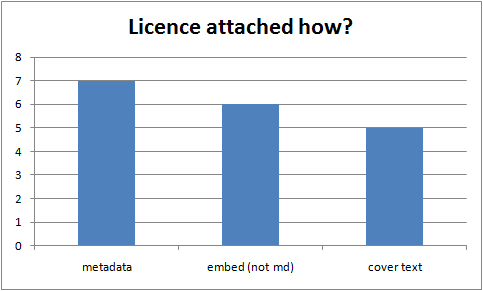What licence have UKOER 2 projects used and how have they associated it with their content? This is a post in the UKOER 2 technical synthesis series.
[These posts should be regarded as drafts for comment until I remove this note]
Although, a project’s choice of licence is not a particular concern of a technical synthesis, how the licence is associated with the open content is a technical issue (see also Self description), and many of the available discovery services look for and only recognise particular licence types (typically Creative Commons – see Scott’s post).
Licence choice
Encoding choice
Notes
- A few projects use multiple options for licences, but on the whole each of these choices represents a single project.
- A few projects hadn’t chosen at the time of the review calls.
- Some projects use multiple methods to associate their licence with their content.
- Licence encoding options are: entry in a formal descriptive metadata record, encoding in file structure (eg in Word file) or page markup (eg wiki or html), creation of human readable licence information as part of content (eg cover page)
- Consent Commons is a initiative by the Medev subject centre to develop a licence to support the recording of patient and practitioner consent around the use of their personal data. It is beign developed in the style of a Creative Commons licences to offer a simple statement of types of use which are permitted without further permission being sought (i.e. providing consent for some use in a non-transactional licence).
- many of the Strand C collection projects are working with materials under a variety of licences – consequently a number of them don’t have a particular licence choice and aren’t represented here.
Comments
- Although the use of the CC: nd clause works against usage some projects have found it necessary in light of 3rd party or patient rights
- Projects had a strong steer to use a cc: by license, but it seems only a few have been able to do this – it is noteworthy that more projects opted to use the open but restrictive cc: by sa option. For example the Triton project has chosen CC:BY SA for the blog posts which form its ‘static’ collection. As a result any pictures which use in those posts need to have either a CC: BY or CC: BY SA licence. They discuss this in more detail on p5-6 &24 of Triton final report , as well as Appendix 3
- CC: BY NC SA remains the most popular option
- One project developed software artefacts and used the GNU GPL.


I must admit I’m very surprised that so few projects chose to use cc:by after it was strongly recommended by the programme. It would be interesting to do some follow up research to find why this has been the case.
Pingback: UKOER 2: Technical synthesis introduction
I think the jury is still out on the merits of the “NC” clause. If you use BY SA – any commercial organisation has to share back don’t they?
@Viv arguably, yes but as you note the trick is that is anyone using your content has to use By SA as well – in theory this makes things more open but because it forces anyone using your content to cascade the licence. However, users of your content can’t use either CC: BY SA NC to (in theory) prevent commercial use or use CC: BY to permit any form of use. It also means you can’t, for example, use most of the content from UKOER 1 and 2… [only CC: By and CC: By SA). It’s one of the reasons the programme tried to push CC: BY.
Pingback: The OER Turn : Information Environment Team
ok, this may be a slight tangent but it serves as good illustration of the tension in choosing a licence: Scott Leslie’s written a piece about possible licence choice impact on SEO http://www.edtechpost.ca/wordpress/2011/09/19/seo-as-enclosure/ – do you want your content to be as widely shared as possible (including by people who sell want to sell access to it) or do you want your site (as a source of open content) to be as prominent as possible?
Pingback: UKOER 2: Licences and encoding | iTunes U as a Channel of Open Educational Resources | Scoop.it
Pingback: UKOER 2: Licences and encoding | Open Educational Arts Practice | Scoop.it
Pingback: UKOER 2: Licences and encoding | ORIOLE project | Scoop.it
Pingback: UKOER 2: Licences and encoding | Creating Podcasts & Vodcasts for education | Scoop.it
Pingback: UKOER 2: Licences and encoding | Open Education Resources | Scoop.it